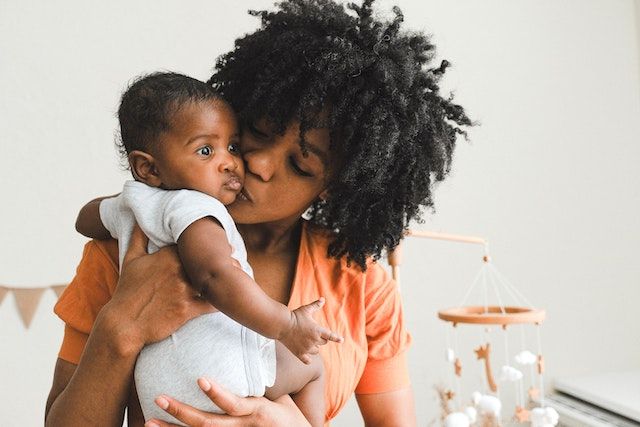As a new mother, I faced a sudden shift in my daily routine after the arrival of my daughter. My life became intertwined with a newborn who was fully dependent on me for survival.

It becomes hard for a mother to balance between taking care of herself and the baby who demands full attention. Therefore, it is not shocking that most new mothers battle mental health issues, especially postpartum depression during the first 3 months.
According to statistics by the World Health Organization (WHO), 13 % of women experience postpartum depression. The number gets worse in developing nations where 20% of mothers are recorded to suffer from depression after childbirth.
Unfortunately, most mothers dealing with mental health conditions do not know how to seek help. Others are not even aware that they are suffering from mental health issues and that they can be treated. So, what is depression, or specifically, postpartum depression?
What is depression?
Clinical depression is defined as a mental health disorder that is manifested through persistent feelings of sadness, irritability and emptiness. A person with depression may experience a consistent decline in interest in the activities that used to excite them. In other instances, one may have poor concentration, an excessive sense of low self-worth, low energy, disturbed sleep and suicidal thoughts.
Overall, anyone can suffer from depression at any point in their lives. However, women are more likely to develop depression in the first year post-delivery, which is referred to as postpartum depression. For some, depression can start during pregnancy and is referred to as prenatal depression. The situation is worsened if the mother is exposed to poverty or domestic and gender-based violence.
Signs of postpartum depression
The first 3 months after delivery are especially hard to navigate because both mother and child are navigating uncharted waters. Here are some signs that may indicate that a mother is suffering from postpartum depression.
1. Poor personal hygiene
A depressed mother may find herself lacking proper personal hygiene. This may manifest in not bathing, brushing their hair or changing clothes. Some mothers may even find themselves skipping meals or not eating adequately because they are overwhelmed by feelings of emptiness.
In turn, the newborn baby is affected because if the mother is unable to take care of herself the baby ends up neglected. If the mom cannot take a bath the baby will also not be bathed. Sometimes, a depressed mother may even forget to change the baby’s diaper or breastfeed them.
2. Fatigue
A newborn baby is demanding and is bound to wake up during unholy hours of the night. For the first 12 weeks, a mother may find it difficult to sleep more than 3 hours at a time. This means that they will constantly feel fatigued both day and night.
I remember being advised to sleep as much as possible while pregnant because once the baby was born sleep would become a luxury. This advice did not make sense until I found myself rocking my infant daughter back to sleep 5 times a night.
For depressed mothers, it becomes harder to get even a little sleep because their sleep time is interrupted by sad intrusive thoughts.
3. Poor mother-baby attachment
In most cases, depression affects maternal bonding which leads to insecure attachment between mother and child. This is because bonding is a psychological process and depression interferes with this process. Feelings of worthlessness and guilt hinder the mother from forming a healthy emotional connection with their child.
Additionally, depression can make mothers question their parenting skills. Feeling inadequate, they may start to avoid taking care of their baby. This leads to a poor response and interpretation of the child’s needs and behaviour. In turn, the baby’s cognitive and emotional development is affected during infancy and later in life.
Any mother who notices that she is going through the above should seek medical attention as soon as possible. On the other hand, there are some steps a new mom can take to deal with depression.
Steps for dealing with postpartum depression
1. Seek family support
I remember how hard it was to take care of my baby since I had a Caesarean delivery. Taking care of my wound while looking after a newborn was exhausting. It was at this point that extended family members stepped in to lend a hand. My mother-in-law particularly took charge of making my meals and washing the baby. This enabled me to get enough rest and rebuild my strength.
Therefore, if you are a new mom, tap into your family for help. Another alternative is to hire a nanny so that you can have somebody to help with the baby.
2. Take time for yourself away from your baby
The first weeks postpartum are extremely hard because the baby has not adapted to a sleeping schedule. Newborns also suffer from colic, giving them distressed sleep. Due to this, I used to wake up feeling exhausted from the long sleepless nights. It affected my mood, making me feel overwhelmed with motherhood.
However, once I started taking time for myself – by going on evening walks – I started feeling better. I would leave when the baby was napping and come back an hour later. My mood would be uplifted immensely. I would be happy to see my baby again and ready to take on motherhood.
3. Tap into social circles
One thing that has worked out amazingly for my motherhood journey is socialising with fellow moms. A mom friend of mine introduced me to mom groups on Facebook and they have served me well. We get to discuss all motherhood and baby issues like dealing with baby colic, cracked nipples, weaning tips, and how to deal with baby teething.
Being in a community of people who share similar challenges has given me confidence in my motherhood journey. I am comforted knowing that I am not alone and things will get better as my baby grows.
4. Go for counselling
Last year, the senate proposed a motion in parliament asking for the establishment of counselling centres in all county hospitals. According to nominated Senator Hamida Kibwana, all healthcare providers should undergo mental health training regularly. Thus, any mother battling postpartum depression should walk into the nearest county hospital and ask for counselling.
Alternatively, there are toll-free lines, such as the Chiromo Mental Health Hospital (0729 359 501), which offer counselling services. The sessions can be conducted physically or online through video calls. Also, counselling is impactful since it helps mothers to positively navigate the challenges of motherhood.
Wrapping up
Mental health is increasingly becoming a fundamental part of human life. As a mother, mental wellness is particularly important to me since it contributes to my quality of life and overall well-being. It also affects my motherhood journey, especially how I relate to and nurture my daughter.
My advice to new moms is that you should not lock yourself away. Trying to look after a child alone will drain you. Instead, interact with people. It eases your mind and motivates you to embrace motherhood with grace. Most importantly, you learn to celebrate one milestone at a time.





